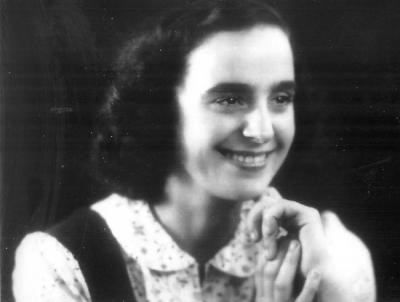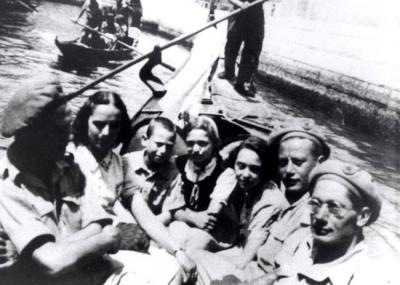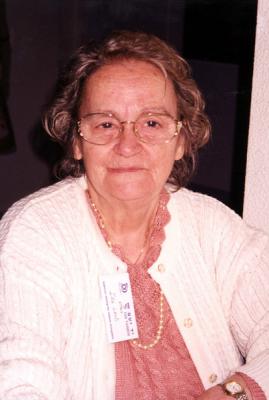A Mother's Deathbed Confession
Yuzzi Galambos, a beautiful Jewish dancer, was 17 years old when she fell in love with the 35-year-old Hungarian non-Jewish singer, Kalman Toth. In 1930 she joined him on a tour in Italy. They lived the life of wandering artists, going from place to place, from performance to performance. By 1935 the couple had three children.
In 1940, the Italian authorities forced Kalman to leave the country, and he returned to Hungary, where he enlisted in the Hungarian army. Due to health problems he was hospitalized, and in 1942, the correspondence with him ceased. He probably died, but nothing is known about his fate.
With her husband gone, Yuzzi was left all alone. Her mother, Luise Galambos, was in Vienna, from where she was deported in February 1941 to Oppole, Lublin District, in Poland. She was able to correspond with her daughter until the letters stopped coming. It is unknown when and where she was murdered.
Struggling to earn a living, Yuzzi worked as a translator and gave private lessons in German. She lived with her three children in Castiglion Fiorentino (Arezzo) in Tuscany where they had rented a flat in an isolated farm-house, with no running water. The young girl she had hired as baby sitter stayed with her and watched the children. Ida Brunelli (later Lenti) was fifteen years old when she was employed to take care of housekeeping and the three children: Alessandro-Sandro (later Zvi Yanai, former director general of the Ministry of Science and Technology in Israel), his sister, Fiorenza (later Judit Adler) and Lisetta. Yuzzi hid her Jewish origin even from the baby-sitter and had the children baptized.
In 1943, the year the Germans occupied Italy, Yuzzi became gravely ill with a heart condition and died of angina pectoris in January 1944. On her deathbed, the mother pleaded with Ida to take care of the orphans, aged 9, 12 and 13. She also revealed to her that they were actually Jewish and gave her the family documents. Young Ida was faced with terrible challenges, but did not abandon the children and became like a mother to them. The young girl had to shoulder the responsibility of raising three children with no economic means whatsoever, all the time keeping the secret about their being Jewish, and facing the terrible danger of discovery by the Germans or the Italian militia. In desperation, she decided to take them to her mother, Maddalena, who lived in the village of Monselice in Padua province, northern Italy. They were introduced as Hungarian refugees, and no one knew they were Jewish. Ida was unable to provide for the children all by herself, so she turned for help to the mayor. To him she disclosed the children’s real identity, and he was prepared to extend his help. The three children were put in various Christian institutions near Padua. Ida acted as the children’s sole guardian; she visited them regularly, and they spent every Sunday with her. Throughout the war period, Ida Brunelli, an inexperienced young girl entrusted with three children, acted with unique maturity. She worked hard on their behalf, keeping in mind their dying mother’s last words. After the war, through the mayor, Ida contacted the Jewish Brigade soldiers who were looking for hidden Jewish orphans throughout Italy. One of the soldiers, Shlomo (Sever) Rovitz, still remembers that day in June 1945, when 18-year-old Ida appeared with three children in the military camp in Santa Colomba, near Siena. She told him that the children were Jewish and described what they had gone through. Rovitz spent some time with the children, verifying Ida’s story. He was extremely impressed with Ida’s courage and dedication. Ida was reluctant to leave the children in the camp with the Jewish soldiers. She wanted to make sure they were safely on board the ship leaving from Naples and for a whole month she wandered with the children from camp to camp until she was certain they were in good hands. In 1950, Ida wrote a letter to the chief rabbi in Rome, telling him her story. The Italian Jewish weekly Israel published an article entitled “A Case of Conscience.” Ida lived very modestly, married late, and did not have any children of her own. She died in 2008.
On February 24, 1993, Yad Vashem recognized Ida Lenti as Righteous Among the Nations. In 1998, Ida Lenti came to Isarel as part of a delegation of 50 Righteous Among the Nations from various countries, who were invited to the celebrations marking the fiftieth anniversary of the State of Israel.









